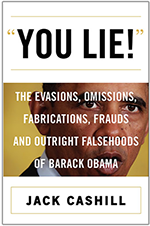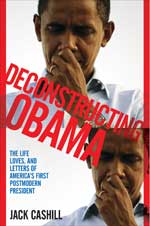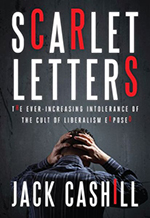Why Urban Schools Can't Be Fixed
Order Jack Cashill's newest book,
Scarlet Letters
___
Get your copy of Jack Cashill's book, "You Lie!"

___
Get your copy of Deconstructing Obama

___
Jack Cashill's book:
Hoodwinked: How Intellectual Hucksters have Hijacked American Culture
© Jack Cashill
WND.com - March 9, 2016
Short of a Third Great Awakening, urban public schools are doomed to fail.
My moment of revelation came in reading two well received books on public education. The Prize by Dale Russakoff tells the tale of Facebook Founder Mark Zuckerberg and his attempt to pump $100 million worth of new life into a school district as old and troubled as Kansas City’s, that of Newark, New Jersey, my hometown.
The Battle for Room 314 is a vivid first person account by teacher Ed Boland of his year-long effort to subdue and, ideally, educate a class of unruly ninth-graders in New York City. Both are unusually candid tales of failure, one on a macro level and one on a micro.
An honest reading of these books by reformers anywhere can only depress. The problems Zuckerberg and pals faced in Newark and Boland faced in New York are all but identical to the problems, macro and micro, educators face in every major city.
The difference is that your local school board is asked to solve the same problems without anywhere near the same resources.
If ever a city had—or seemed to have--the opportunity to reform its school district it was Newark. The city had Zuckerberg’s money, the active bi-partisan support of a Republican governor and an uncorrupted Democratic mayor, and the enthusiastic backing of the national educational reform movement.
Things did not quite work out. The Newark reformers ran smack into the same kind of push back reformers everywhere have faced for the last half century—entrenched teacher unions, a well-oiled patronage machine, and widespread parental paranoia about “outsiders” and their motives.
What Zuckerberg was to Newark Ed Boland was to Room 314. On paper at least, Boland was the kind of teacher principals fight over.
An idealistic non-profit executive, he chose to walk the proverbial walk and retooled in mid-life to become a high school teacher. One reviewer nicely described his mission as “gladiatorial altruism.”
If Boland’s readers were expecting “To Sir with Love” they had to be disappointed. What they got was “To Sir with Loathing.” The students rewarded his creativity and compassion with indifference, contempt, and the more than occasional homosexual slur.
Boland had his small victories as the reformers did in Newark, but in both cases those successes were exhausting and unscalable.
For all their seeming candor, both authors got squirrely on the big issue. As a gay activist and committed liberal, Boland is all but sworn to silence.
Every day for a year he watched kids act out in ways that would not have been tolerated for a minute in the Catholic two-parent family in which he was raised. Yet he refused to ask why it was that today’s students behave so much worse than the students of his youth.
The answer was staring him in the face. Rather than encouraging the men in the community, the state cuckolds them. It woos their women with free health care, reduced rent, EBT cards, even free lunches for the kids.
Indeed, the very idea of the lunch implies that these moms and father figures are incapable of sending their kids to school with a sandwich, let alone a coherent sense of values.
For her part, Russakoff flirts with the core issue but doesn’t allow the reader beyond first base. In one poignant passage, she recounts the valiant efforts of a Newark school “liaison” to increase male involvement.
Knowing that a Father-Daughter dance would have no chance of success, the liaison rechristened the event the Daddy-Daughter Dance and opened it to uncles, brothers, grandfathers, baby daddies, or “any male figure” in the girls’ lives.
The girls loved the event, and the father-figures marveled at seeing “so many Newark men in one room, honoring their daughters.” But having introduced this thread, Russakoff drops it altogether.
Like Boland, she speaks about fatherlessness as though it were a detail no more significant than, say, leaky school roofs or out-of-date textbooks.
Russakoff serialized her book in the New Yorker, a liberal publication whose readers have sold themselves on the happy notion of “family diversity.”
In their world, one kind of family is as inherently worthy as another. A kids’ book popular with this crowd captures this loopy idea in its title, “All Families Are Special.”
Unfortunately, in celebrating “special” families, the media have been helping destroy our shared culture. In that the rot starts from the inner city and works its way out, they can choose, at least for the time being, not to connect the celebration to the destruction.
By the time they do make the connection, it will be much too late.



